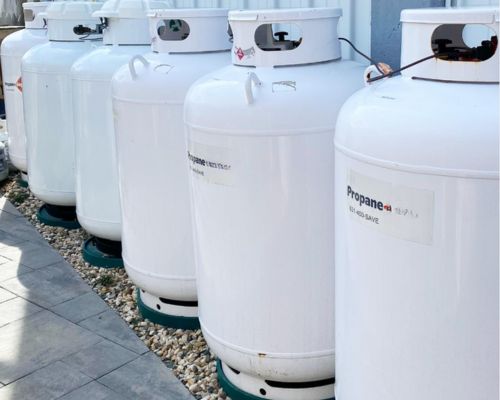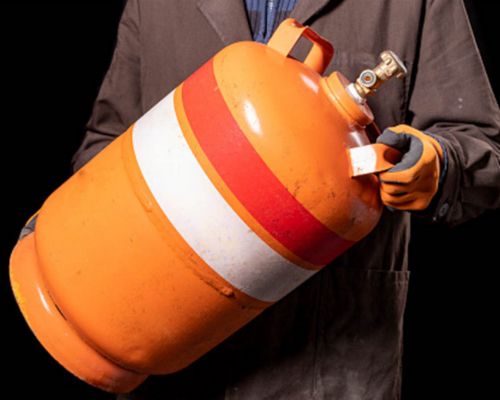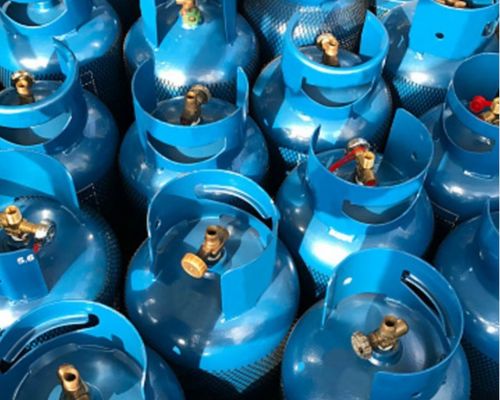A common concern with propane tanks is long-term exposure to sunlight and heat. More specifically, people want to know, “Can propane tanks explode in the sun?”
In this guide, we will address the question of whether propane tanks are safe in the sun. And, if not, at what temperature will a propane tank explode from heat of the sunlight.
Let’s dive in.
Can Propane Tanks Explode in the Sun?
Yes, propane tanks can explode in the sun, but it is a very rare occurrence. Propane tanks have safety features that prevent them from overheating and bursting from the heat of the sun, such as a pressure relief valve and a reflective color.
Are Propane Tanks Safe In The Sun?
Propane tanks are generally safe in the sun, as long as they are not exposed to extreme heat or damaged. However, you should store your propane tanks in a cool, dry, and well-ventilated place, away from sources of heat like direct sunlight—this will keep the tank at a safe temperature to avoid an explosion.

At What Temperature Will a Propane Tank Explode from the Heat?
A propane tank can explode if it reaches temperatures higher than 120 °F (49 °C). As the propane tank gets hotter, the pressure inside the tank will increase, which can cause it to burst open if it exceeds the pressure the tank can safely vent.
However, it is important to remember that it is very rare for a propane tank explosion to occur from the pressure of the propane tank reaching higher than the pressure that the tank can safely vent, causing the tank to rupture. The outdoor temperature would have to be extremely hot from the sun, which is unlikely to reach 120 °F (49 °C) or above.
This kind of explosion from extreme heat is called a Boiling Liquid Expanding Vapor Explosion (BLEVE).
Understanding Propane Boiling Liquid Expanding Vapor Explosion (BLEVE)
A propane BLEVE is a type of fire-related accident that can occur when a pressurized container of propane is exposed to extreme heat. When the temperature of the propane exceeds its boiling point, it rapidly expands and creates a high pressure inside the container.
If the container cannot vent the pressure or withstand the stress, it can rupture and release a large amount of flammable gas and liquid. This can result in a powerful blast and a fireball that can cause severe damage and injury.
Keep in mind that a propane BLEVE will only occur if the conditions are perfect, such as being subject to continuous extreme heat over a period of time. Therefore, the possibility of a propane tank explosion (BLEVE) is extremely unlikely to occur.

Safety Features of Propane Tanks
- Room for expansion: Propane tanks are designed to have empty space inside them, which allows the propane to expand and contract with temperature changes. This prevents the tank from reaching a critical pressure that could cause it to rupture or explode. Propane tanks are typically filled to 80% of their capacity as a safety precaution.
- Pressure relief safety valves: Propane tanks have one or more valves that can release excess pressure from the tank if it becomes too high. This prevents the tank from exploding if the room for expansion fails to keep the pressure under control. The valves are usually located on the top or the side of the tank and have a spring mechanism that opens them when the pressure reaches a certain threshold.
- Reflective colors: Propane tanks are usually painted in light, reflective colors, such as white or silver, to reduce heat absorption from the sun or other sources. This helps to keep the temperature and pressure of the propane inside the tank at a safe level.

Tips To Minimize The Risk Of A Propane Tank Explosion
To reduce the risk of an explosion, follow these safety tips:
- Close the propane tank when not in use to prevent a BLEVE (boiling liquid expanding vapor explosion).
- Routinely check the connections and hoses for leaks.
- Monitor your gas grills while they heat up.
- Avoid storing propane tanks near open flames to prevent large and small explosions.
- Keep the propane tank in a shaded area, and out of direct sunlight.
- Don’t expose the tank to heat over 120 °F (49 °C).
- Keep a safe distance between a propane tank and a tank in use. High temperatures can open bleeder valves and cause a fire to spread.
- Familiarize yourself with the propane smell. Learn this smell to detect leaks. Propane has no odor, so a chemical is added to make it smell like rotten eggs to comply with OSHA (Occupational Safety and Health Administration) requirements.
Are Propane Explosions Common?
Propane explosions are rare. According to the Consumer Product Safety Commission, about 600 propane tank explosions and fires occur each year, resulting in injuries to about 30 people.
The most common causes of propane explosions include:
- Gas tank leaks: Propane can leak out of the valves or connections due to damage or improper installation.
- Improper use: Propane can ignite when it comes in contact with a flame or a spark from a gas stove, dryer, or other appliance.
- Negligent maintenance of tanks: Propane can build up pressure and rupture the tank or the appliance if they are not inspected or serviced regularly.
- Faulty pressure release valve: If the valve is faulty, it may not open at all, or it may open too late, causing the pressure inside the tank to exceed the capacity of the tank and burst open.
Understand the Risks of Propane Tanks Exploding In the Sun and Heat
As you learned, whether propane tanks are safe in the sun depends on several variables. Propane tanks can explode in the sun if the temperature gets too hot and the pressure of the propane tank reaches higher than the pressure the tank can safely vent, causing it to burst open.
Although explosions are uncommon, it is important to follow the safety tips listed above to minimize your risk of a propane rupture while grilling or storing a propane tank outside.
